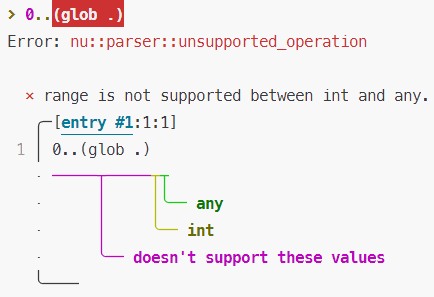mirror of
https://github.com/nushell/nushell.git
synced 2025-08-06 11:09:32 +02:00
# Description As part of fixing https://github.com/nushell/nushell/issues/13586, this PR checks the types of the operands when creating a range. Stuff like `0..(glob .)` will be rejected at parse time. Additionally, `0..$x` will be treated as a range and rejected if `x` is not defined, rather than being treated as a string. A separate PR will need to be made to do reject streams at runtime, so that stuff like `0..(open /dev/random)` doesn't hang. Internally, this PR adds a `ParseError::UnsupportedOperationTernary` variant, for when you have a range like `1..2..(glob .)`. # User-Facing Changes Users will now receive an error if any of the operands in the ranges they construct have types that aren't compatible with `Type::Number`. Additionally, if a piece of code looks like a range but some parse error is encountered while parsing it, that piece of code will still be treated as a range and the user will be shown the parse error. This means that a piece of code like `0..$x` will be treated as a range no matter what. Previously, if `x` weren't the expression would've been treated as a string `"0..$x"`. I feel like it makes the language less complicated if we make it less context-sensitive. Here's an example of the error you get: ``` > 0..(glob .) Error: nu::parser::unsupported_operation × range is not supported between int and any. ╭─[entry #1:1:1] 1 │ 0..(glob .) · ─────┬─────┬┬ · │ │╰── any · │ ╰── int · ╰── doesn't support these values ╰──── ``` And as an image:  Note: I made the operands themselves (above, `(glob .)`) be garbage, rather than the `..` operator itself. This doesn't match the behavior of the math operators (if you do `1 + "foo"`, `+` gets highlighted red). This is because with ranges, the range operators aren't `Expression`s themselves, so they can't be turned into garbage. I felt like here, it makes more sense to highlight the individual operand anyway.
Nushell core libraries and plugins
These sub-crates form both the foundation for Nu and a set of plugins which extend Nu with additional functionality.
Foundational libraries are split into two kinds of crates:
- Core crates - those crates that work together to build the Nushell language engine
- Support crates - a set of crates that support the engine with additional features like JSON support, ANSI support, and more.
Plugins are likewise also split into two types:
- Core plugins - plugins that provide part of the default experience of Nu, including access to the system properties, processes, and web-connectivity features.
- Extra plugins - these plugins run a wide range of different capabilities like working with different file types, charting, viewing binary data, and more.